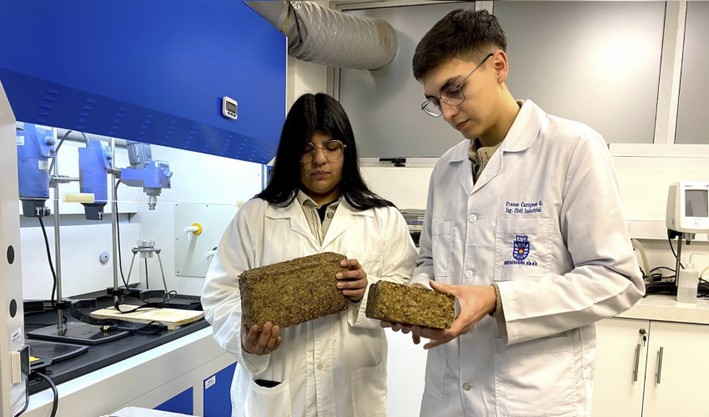- It’s called Calory Bricks, a sustainable briquette made from forest waste, which stands out for polluting 99% less.
Driven by the need to find a sustainable solution to the pollution caused by wet firewood use in southern Chile and the spread of forest fires, two young Industrial Civil Engineering students from the Universidad del Bío-Bío (UBB) created an innovative firewood alternative made from forest residues.
They are Constanza Soto (22) and Franco Cariqueo (22), who developed Calory Bricks, a briquette that significantly reduces pollutant emissions and offers competitive advantages in terms of efficiency and cost.
Cariqueo highlights the briquette’s positive environmental impact: "Compared to traditional firewood, it reduces particulate matter emissions by up to 99.4%, representing an effective solution to improve air quality in cities—where 8 of the 10 most polluted urban areas in South America are Chilean, including Coyhaique, Nacimiento, Temuco, Victoria, Angol, and others, according to a study by IQAir, a Swiss air quality technology company."
In this regard, he adds, "By converting forest waste into briquettes for slow-combustion stoves, we will reduce the particulate emissions generated by domestic firewood use, which accounts for 87% of national MP2.5 emissions, causing over 2,000 premature deaths annually."
Regarding heating power, the students claim it is up to 18.5% higher, and its burn time is also up to 30% longer than conventional firewood, making it a more efficient and sustainable heat source.
From an economic perspective, they explain that within the business model they are developing, the briquette would be competitively priced compared to traditional firewood, making it highly attractive for mass distribution through supermarkets, local stores, and wholesale sales.
How the Idea Was Born
Constanza Soto recalls that Calory Bricks emerged from their participation in the Torneo Verde by IncubaUdeC, an initiative that brought together over 100 students to seek sustainable solutions for corporate challenges. "We visited a Cmpc property in Los Ángeles, where forest waste management was discussed, and we concluded that we could repurpose it with a preventive focus to curb uncontrolled wildfire spread," she said.
They also considered "replicating wood pellets, but the innovation needed to have a significant social impact. The issue of firewood use and the deep-rooted culture of slow-combustion stoves in rural areas of our country—where a steady electricity supply is lacking—led us to focus on a solution that wouldn’t require infrastructure replacement."
Currently, their project is in the capital-raising phase and establishing joint ventures with forestry companies to scale production and distribution. The market size in Chile is estimated at 115 billion pesos annually, representing nearly 2 million households in southern Chile, with an average firewood consumption of up to 18 m³ per household in Patagonia.
Additionally, with support from Irade and the Suma program, Franco Cariqueo had the opportunity to travel to Boston to present the research. "During the trip, I experienced one of the world’s most powerful innovation ecosystems, visited leading companies like Ginkgo Bioworks and IDEO, and learned from experts while immersed in top universities like Harvard and MIT. This experience helped me envision how our project could not only impact Chile but also expand horizons and improve practices in more developed markets," he explained.
Meanwhile, UBB’s Faculty of Engineering Dean, Patricio Álvarez, stated, "We are working intensely to foster a culture of innovation in our community, particularly among our students, so they perceive societal challenges as opportunities to unleash their creative potential, encouraging collaborative work, critical thinking, and effective communication. Through the combined strengths of diverse stakeholders, they can become active agents of societal development early on."







Comentarios (0)
No hay comentarios aún. ¡Sé el primero en comentar!
Deja un comentario